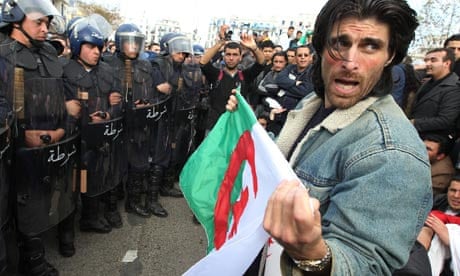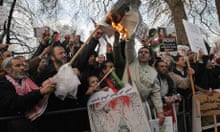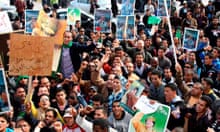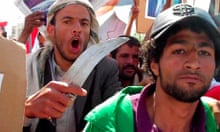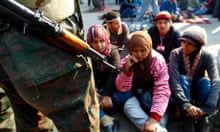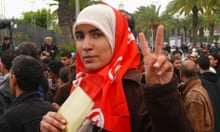I thought I should see for myself the impact of these revolutions on the Arab street. The Arab street in Europe, that is. So I have come back to the Calle de Tribulete in Madrid. Along this one narrow street, with its seedy bars and phone-and-internet locutorios, where immigrants talk to their convulsed homelands, you meet Moroccans, Tunisians, Algerians – and, in a dusty little shop called the House of Pharaoh, a young Egyptian, Safy. He came here three years ago from the Mediterranean port of Rashid, or Rosetta, where Napoleon's troops found the famous Rosetta stone.
What Safy tells me, and Mokhtar, and Muhammad (several Muhammads) is this: at last there is some hope at home. And if those hopes are realised, if what an Algerian migrant worker calls his "mafia government" also goes, if there is a real prospect of jobs, housing and yes, more freedom, they will go home. They are here in Spain to make a better life for themselves and their children. There is much they like about being here, although they say anti-Muslim prejudice has got worse since the Madrid bombings of 2004. But given the chance, they will go back. For now there is "how do you say – l'espoir?".
This is not just any European Arab street, though you can find the likes of it in every larger city in western Europe. No, this is the very street from which some of the Madrid bombers came. They used to meet in La Alhambra, a quiet cafe-restaurant. A man called Jamal Zougam worked in one of those talk-to-home locutorios. He prepared the mobile phones that detonated the bombs which killed so many innocent Spanish commuters on the trains into the nearby Atocha station on 11 March 2004. When I was here six years ago, I met young men who had pictures of Osama bin Laden on their mobile phones. They spoke of their fear, anger about the Iraq war, and desperation.
Today those locutorios and mobile phones are alive with better tidings. In the House of Pharaoh, Safy and Ibrahim rejoice at his fall. And the man behind the bar at La Alhambra, a thoughtful Moroccan who once studied medieval history, talks warily of possible change for the better in the kingdom of his birth. In free elections, he says, Moroccan Islamists could do well, but they would be peaceful, law-abiding, democracy-respecting Islamists like those in Turkey, "only even more moderate".
Well, as Herodotus says, my business is to record what people say – but I am by no means bound to believe it. I am the last person to overstate the significance of an afternoon's vox pop on one Arab street. Only a fool would fail to recognise that this is a moment of danger, as well as opportunity. The path forward for Tunisia and Egypt is far less clear than it was for east European countries – and there is no warm, safe house of EU membership beckoning at the end of the road.
In the long run what I heard on Tribulete street might mean that some migrants go back to their countries of origin. For now there are more than 5,000 Arab boat people on the Italian island of Lampedusa, most of them from Tunisia. "The revolution has changed nothing," they tell Le Monde – and they want Europe to give them work.
In the confusion of a new semi-freedom, some very nasty old worms will come out of the woodwork. I got a small taste of this from a young Moroccan sitting at a bus stop here. Apropos nothing in particular, he started telling me that "all the problems in the world are the fault of the Jews". The prophet Muhammad had a problem with the Jews, he explained, and ever since the Jews have been making trouble for the Muslims. He worships at a mosque where the chief imam is from – how did you guess? – Saudi Arabia.
Trying to jam the lid back on young Arabs' manifest discontents by propping up corrupt Arab autocracies – including the Wahabi Imam-funding Saudi Arabia – as America and Europe have done for far too long, is merely to trade bad trouble today for worse tomorrow. We must now seize the chance, take the risk, and concentrate our best minds on working out how with the limited means at our disposal we can help freedom-hungry Arabs to reach the best possible destination.
But how? That is a question to which I hoped to hear some answers in Spain. For no European country is closer to the Arab world: just 13km across the Mediterranean, at the nearest point to Morocco. This is the place where Europe and North Africa are joined at the hip.
What I have so far heard from Spanish policymakers and analysts is disappointing. Yes, this country has expert knowledge of the Maghreb, and especially of Morocco, but its policy is constrained by fears of a wave of immigration across those narrow straits (which the Moroccan authorities currently help it to limit) as well as Islamist terrorism, drugs and crime; security concerns about Spain's north African exclaves of Ceuta and Mellila; and close ties with the Moroccan monarchy. Should Sunday's planned demonstration in Morocco be the beginning of something big, they really don't know what they'll do.
If Spain has no strategy, France has had something worse: a bad one. In the pursuit of a shortsighted, soi-disant realism, its political and business elites have been as thick as thieves with the rulers of North Africa. And, as WikiLeaks has helped a wider public to understand, when we say thieves, in the context of north African Arab rulers, we mean thieves.
President Nicolas Sarkozy has also saddled Europe with a worse than useless outfit called the Union for the Mediterranean. Its founding co-president, alongside Sarkozy himself, was none other than Hosni Mubarak. This 43-country waffle shop has an array of cumbersome, dysfunctional committees and projects, wholly unfit for purpose. Now that we do need a union for the Mediterranean, we should really start by abolishing the Union for the Mediterranean.
As for Europe's other major Mediterranean power, Italy, its prime minister's deep personal interest in Arab affairs has just landed him in court – to stand trial for allegedly paying to have sex with a then under-aged Arab nightclub dancer called Karima el-Mahroug.
More seriously, all of Europe's leaders are preoccupied with failing banks, public spending cuts and the existential crisis of the eurozone. A farsighted Spanish policymaker tells me that what we need to offer across the Mediterranean is "a Marshall Plan with a strong political component".
That will be about as attractive to hard-pressed, belt-tightening Europeans as the prospect of handing their jobs to those Tunisians on Lampedusa.
So on a cold-eyed analysis, you can end up as sceptical about the likely European response to the "Arab 1989" as about the outcome of the thing itself. But if the EU does not now come up with a generous, imaginative and strategic response to what is happening on the Mediterranean's southern shore, then that failure will one day come back to haunt us on all the Arab streets of Europe.
